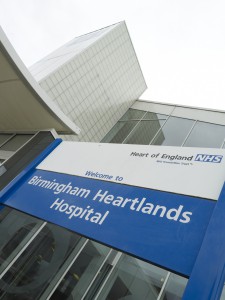 Stroke survivors and staff at Heartlands Hospital have helped pave the way forward for care of stroke patients through their part in a major regional research project.
Stroke survivors and staff at Heartlands Hospital have helped pave the way forward for care of stroke patients through their part in a major regional research project.
With almost 12,000 people across the West Midlands suffering from a stroke each year, this major health problem requires quick diagnosis and treatment to improve the prospects of recovery. Patients, nurses, doctors and other members of staff from Heartlands and other local healthcare providers contributed to the Collaborations for Leadership in Applied Health Research and Care (CLAHRC) project to improve stroke health services.
As a result of the University of Birmingham five-year study, a new way for ambulance crews to record the onset of stroke has been introduced. The FAST test (Facial weakness, Arm weakness, Speech problems, Time to call 999) used to identify the onset of a stroke, has been adapted for paramedics so the ‘T’ now stands for ‘time of onset’. This means vital information isn’t lost which aids speedier treatment.
The researchers have also developed educational board games called: ‘strokes and ladders’ and ‘FASTest Route’ to promote public understanding of stroke signs and symptoms and the importance of calling the emergency services.
These games are now being taken to local family and community events.
The five year study looked at every aspect of the patient journey from the onset of symptoms, through diagnosis and treatment in hospital, to the quality of aftercare and support.
Heartlands Hospital’s elderly medicine consultant, Dr David Sandler, said: “This was a collaborative effort between Heartlands Hospital, the University of Birmingham and other partners. The results in action have helped us pull together our emergency stroke pathways allowing stroke patients to access investigations and treatment sooner. We are proud to have been a major part of this research.”
Dr Ruth Mellor, CLAHRC stroke manager and research fellow, said: “I’d like to thank everyone who took part in this study. We’ve worked together with healthcare professionals across the NHS, but we couldn’t have done this without the contribution from patients and staff at Heartlands Hospital.”
To see the research summary and to view the ‘strokes and ladders’ and ‘FASTest Route’ educational games, go to: http://www.clahrc-bbc.nihr.ac.uk/documents/Th7_LaySummary.pdf






